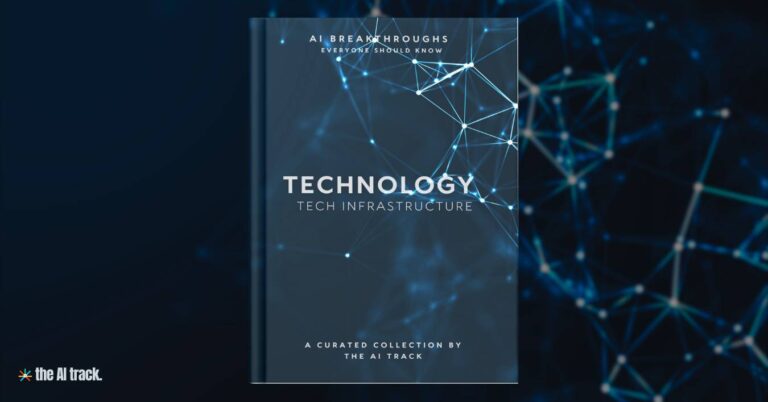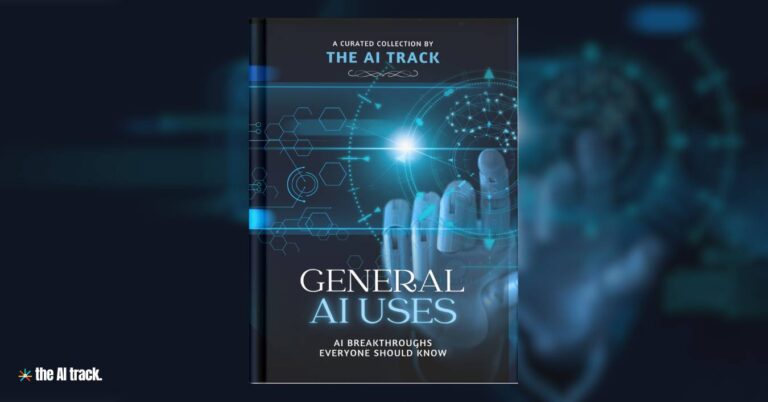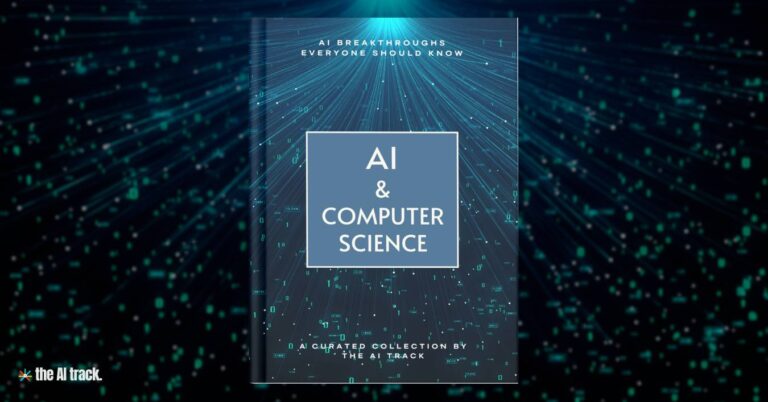
AI is transforming industries by optimizing processes, enhancing productivity, and driving innovation. This section showcases the key AI breakthroughs in business that are totally reshaping all business sectors.
Browse all the other fields in our curated collection of the most important AI Breakthroughs. Each section offers insights into how AI is transforming different sectors, providing a comprehensive view of its impact across a wide range of disciplines.
AI Breakthroughs in Computer Science - At a Glance
How AI in Finance and Banking is Changing the Game: From Automated Trading to Personalized Banking Experiences

The AI Track’s extensive analysis of the impact of AI in Finance, detailing how it customizes financial services and improves risk management and fraud detection. It discusses AI’s advancements in personalization, security, and efficiency within the finance sector.
SoftBank's SoftVoice AI, designed as an 'emotion-canceling' tool for call center workers
Original Article Title:
Call Centers Introduce ‘Emotion Canceling’ AI as a ‘Mental Shield’ for Workers.
Source: Gizmodo
Date: 20 June 2024
SoftBank’s new AI platform, SoftVoice, aims to revolutionize call centers by using advanced AI to handle customer service tasks, enhancing efficiency and reducing human workload.
Key Points:
- Introduction: SoftVoice is SoftBank’s latest AI-driven call center platform.
- Capabilities: The AI can manage various customer service functions, including answering queries and resolving issues.
- Partnership: SoftVoice has partnered with First Horizon Bank to implement this technology.
Why This Matters: The adoption of AI in call centers can significantly improve service efficiency, reduce costs, and free up human agents for more complex tasks.
India's quick commerce apps are transforming online shopping by offering ultra-fast delivery times
Original Article Title:
Delivered in an instant: India’s quick commerce apps shake up online shopping
Source: South China Morning Post
Date: 17 June 2024
Key Takeaway: India’s quick commerce apps are transforming online shopping by offering ultra-fast delivery times, catering to the growing demand for instant gratification.
Key Points:
- Market Growth: Quick commerce is rapidly expanding in India, driven by urban consumers’ demand for speed.
- Business Models: Companies are investing in dark stores and leveraging AI to optimize delivery routes.
- Challenges: Sustainability and profitability remain significant hurdles for these businesses.
Why This Matters: The rise of quick commerce is reshaping consumer expectations and the retail landscape in India.
Key Points:
- Introduction: SoftVoice is SoftBank’s latest AI-driven call center platform.
- Capabilities: The AI can manage various customer service functions, including answering queries and resolving issues.
- Partnership: SoftVoice has partnered with First Horizon Bank to implement this technology.
Why This Matters: The adoption of AI in call centers can significantly improve service efficiency, reduce costs, and free up human agents for more complex tasks.
Retail owners using artificial intelligence to detect shoplifting in real time
Original Article Title:
Retail owners using artificial intelligence to detect shoplifting in real time
Source: CBS News
Date: 8 August 2024
Retail owners are increasingly turning to artificial intelligence (AI) technologies, such as Veesion, to combat shoplifting in real-time. Veesion’s AI-driven system, integrated with existing store cameras, detects gestures associated with theft, helping to significantly reduce losses.
Key Points:
- Shoplifting Losses: A Forbes survey revealed that nearly 80% of retail store owners lose between $500 and $2,500 monthly due to shoplifting.
- Veesion AI Technology: Veesion is an AI technology that integrates with existing surveillance cameras to detect suspicious gestures, such as hiding items in jackets, trousers, or bags, which are commonly associated with shoplifting.
- Global Adoption: Veesion has been adopted in 4,000 stores globally, including 500 in the U.S., and the number of installations is growing.
- Advanced Algorithm: The AI system analyzes multiple cameras simultaneously, using components like human detection, pose estimation, and object recognition to assess the likelihood of theft.
- Bias Reduction: Unlike human operators, Veesion’s AI focuses solely on body movements, which reduces potential bias in detecting shoplifters.
- Real-Time Alerts: When the AI detects a potential theft, it sends a video alert to the store owner’s mobile device, allowing them to intervene promptly, which often deters the theft attempt.
Why This Matters:
The integration of AI into retail security systems represents a significant advancement in loss prevention. By leveraging AI’s ability to detect subtle gestures that humans might miss, stores can reduce theft-related losses and improve security without introducing biases. This technological solution not only enhances the efficiency of monitoring but also acts as a deterrent, potentially leading to a decrease in shoplifting incidents.
The Impact of AI in Work: How Artificial Intelligence is Transforming Jobs and Workplaces

Explore how AI is reshaping jobs and workplaces, emphasizing the need for human-AI collaboration and upskilling in the AI-driven workforce. Read now for insights on adapting to AI in work
MIT researchers have developed an AI assistant designed to enhance teamwork by monitoring and coordinating both human and AI agents
Original Article Title:
AI assistant monitors teamwork to promote effective collaboration
Source: MIT News
Date: 19 August 2024
MIT researchers have developed an AI assistant designed to enhance teamwork by monitoring and coordinating both human and AI agents. This system aims to improve collaboration in high-stakes environments, such as search-and-rescue operations, medical procedures, and even complex video games.
Key Points:
- AI Assistant for Team Coordination: Developed by researchers at MIT’s Computer Science and Artificial Intelligence Laboratory (CSAIL), the AI assistant functions as a team coordinator that monitors the actions and plans of team members. It uses a “theory of mind” model to understand and predict the intentions of both human and AI agents, ensuring alignment and effective collaboration.
- Real-World Applications: The AI system is particularly useful in scenarios where coordination is critical, such as during search-and-rescue missions. It can intervene when necessary by providing updates on what each team member has done or intends to do, thus preventing overlap and ensuring that all areas are covered effectively. In medical settings, the AI can monitor and ensure that each step in a complex procedure, like surgery, is carried out correctly, helping to avoid potential errors.
- Theory of Mind Model: This model allows the AI to make decisions based on the beliefs and intentions of team members, using probabilistic reasoning and recursive mental modeling. It can predict possible misunderstandings and correct them, promoting seamless team dynamics. The model was presented at the International Conference on Robotics and Automation (ICRA) and has potential applications in diverse fields, including strategy video games where player coordination is key.
- Potential for Expansion: The researchers plan to further develop the AI assistant by incorporating machine learning techniques to enhance its ability to generate new hypotheses on the fly and by improving its efficiency to handle real-life tasks more effectively.
Why This Matters:
The development of this AI assistant represents a significant step forward in human-AI collaboration. By improving teamwork in environments where precision and coordination are critical, this technology could lead to more effective operations in emergency response, healthcare, and other high-stakes fields. As AI continues to integrate into various sectors, such innovations will play a crucial role in enhancing productivity and safety.
AI Steps In to Help Handle Abusive Customers in Japan's Call Center
Original Article Title:
Japan tech firms tap AI to help workers handle abusive customers
Source: Kyodo News
Date: 14 October 2024

Japanese tech companies NTT Communications and SoftBank are leveraging AI to support call center operators in managing abusive customers, addressing a significant workplace issue in Japan. Their systems aim to reduce stress for employees and enhance customer interactions.
Key Points:
- NTT Communications: Developed a system that provides operators with recommended responses during abusive calls. It alleviates stress and improves handling of difficult situations.
- SoftBank: Created an AI solution that softens customer tones during calls, aiming for commercial use by 2025.
- Kasu-hara Issue: Rising abusive customer behavior in Japan prompted businesses to adopt such AI-driven solutions for workforce protection.
Why This Matters:
Addressing customer abuse with AI reduces psychological strain on workers, improving job retention and satisfaction. This solution also enhances customer interactions, reflecting a broader trend of AI integration in workplace support.
AI is Transforming Global Shipping
Original Article Title:
AI is Transforming Global Shipping
Source: The AI Track
Date: 14 October 2024

The post-pandemic era has accelerated changes in global industries, including commercial shipping, where AI is a game-changer. AI streamlines operations, reduces costs, and boosts safety, addressing challenges like supply chain disruptions and fluctuating demand. Though adoption hurdles remain, AI integration promises improved efficiency and competitiveness.
Key Points:
- Post-Pandemic Shifts in Global Trade:
- The pandemic exposed supply chain vulnerabilities, amplified by geopolitical crises like in the Middle East.
- Historical Importance of Commercial Shipping:
- Shipping has adapted to changes, maintaining its dominance in global trade.
- AI Transformations in Shipping:
- Predictive maintenance: Anticipates ship issues before they occur.
- Smart warehouses: Optimizes inventory and automates systems.
- Traffic management: Predicts congestion for smoother logistics.
- Cost reduction: Optimizes routes and operational costs.
- Safety and compliance: Ensures adherence to regulations, reducing risks.
- AI Adoption Challenges:
- High costs, cybersecurity risks, and potential job losses, but 77% of companies are adopting AI.
- Opportunities and Benefits:
- AI enhances logistics efficiency, competitiveness, and resilience.
- Future Outlook:
- AI is key for automation, insights, and crisis prevention, positioning companies that adapt to lead the industry.
Why This Matters:
AI adoption in shipping is crucial for efficiency, security, and adaptability in global trade. Embracing AI gives companies a competitive edge amid supply chain and geopolitical challenges.
AI presentation apps offer innovative features to simplify presentations. Discover time-saving tools for slide creation, design, and more.






